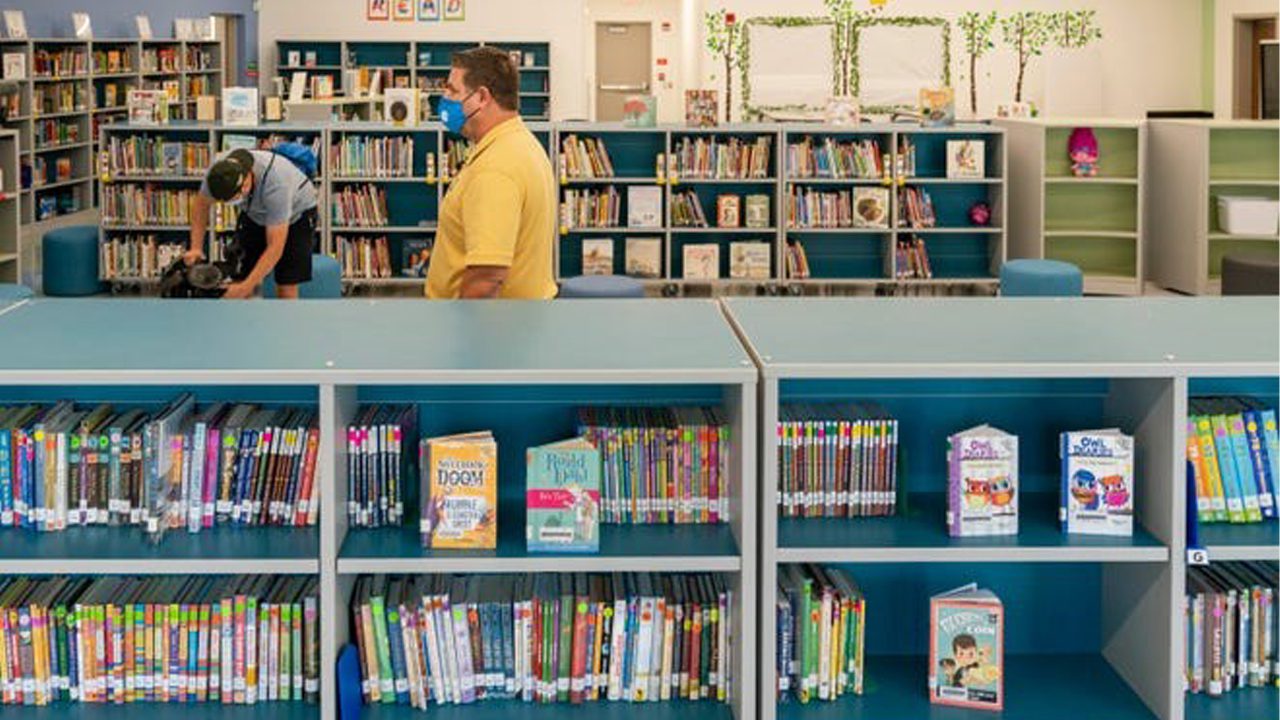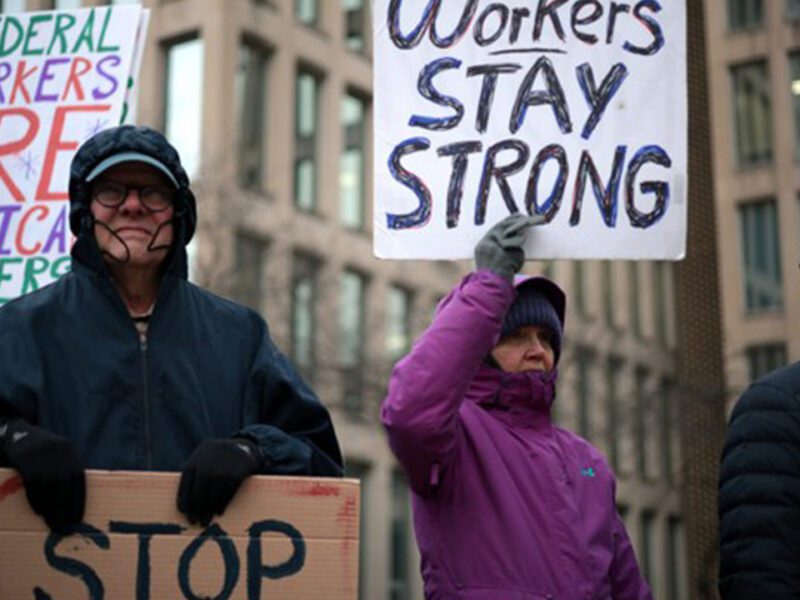
A peek at Florida’s new training for school librarians on deciding which books to pull
Palm Beach Post | By Katherine Kokal | Updated September 5, 2023
School leaders say librarians are ‘under attack’ as they navigate decisions on how to stock media centers.
As the new school year marches on, media specialists in Palm Beach County and across Florida are facing a barrage of state training and speculative guidance from school boards as they try to carefully choose books for school libraries and review materials in teachers’ classrooms.
On the heels of legislation that went into effect July 1, Florida’s Department of Education released a 50-minute online training video required for media specialists to help them decide which books to pull and which to keep on the shelves. But the guidance is vague at some turns and subjective at others — leading to more confusion for media specialists trying to do their jobs.
In one example, the DOE tells media specialists to pull any book that they wouldn’t be comfortable reading excerpts from at a public meeting, according to a review by The Palm Beach Post. In another slide, media specialists are urged to “err on the side of caution” and only choose instructional materials that are “non-inflammatory” and free from “bias, racist or sexist information.”
The training doesn’t give any examples.
“There’s a lot of ambiguity in the language,” school board member Alexandria Ayala said at an Aug. 2 workshop on book challenges. “How are we wrapping our arms around the training of the folks who are responsible for this so they’re not on the hook for misstepping?”
State law doesn’t say media specialists are liable for challenges to library books.
Meanwhile, school district leaders in Palm Beach County are formalizing policies that outline how to challenge books at public schools. Only one book, The Bible, has been formally challenged in Palm Beach County. None has been “banned” or removed permanently.
What’s in the new training for media specialists, which books have been informally challenged and how does the process work?
Here’s what to know:
Have Palm Beach County schools ‘banned’ any books?
Between July 1, 2022, and July 13, 2023, one book was formally challenged in Palm Beach County and five were informally challenged through a complaint to an individual school, according to school district records.
A book is permanently removed only if a formal challenge is submitted, it’s reviewed by the superintendent, it’s heard in a public meeting and then approved by the school board.
In July, the school board heard its only formal challenge of the year, which failed. Barry Silver, a rabbi and parent of a 2023 Olympic Heights High graduate, challenged the Bible being available for checkout at the Boca Raton school.
Silver said the book contained “misogyny, violence, sexual conduct, rape, incest, animal cruelty, abuse, anti-semitism, anti-science and indoctrination.”
His objection was denied four times: first by the school’s material review committee, then by the school’s principal, then by Superintendent Mike Burke and finally by the school board following the public hearing held July 19.
“We have not banned any books in Palm Beach County,” board member Karen Brill said at the hearing. “One parent or one group of parents should not be making decisions for all parents.”
Which books have been informally challenged in Palm Beach County?
Outside the formal challenge process, parents and community members have submitted informal complaints to schools about certain books. Complaints of this type can prompt a review by the school’s material review committee.
The books that were informally objected to were:
- All Are Welcome, a children’s picture book about a day in a diverse classroom written by Alexandra Penfold, was challenged at Loxahatchee Groves Elementary.
- The Unicorn and the Brave Princess, a children’s picture book about a princess written by Claire Phillip, was challenged at Binks Forest Elementary in Wellington.
- Beyond the Grave, a book about paranormal phenomena and ghosts written by Judith Herbst, was challenged at Marsh Pointe Elementary in Palm Beach Gardens.
- Brave New World, a dystopian novel about a society that revolves around science and efficiency written by Aldous Huxley, was challenged at Suncoast High in Riviera Beach.
- Harry Potter and the Sorcerer’s Stone, a fantasy novel about young wizards by J.K. Rowling, was challenged at Jerry Thomas Elementary in Jupiter.
All the books that were informally challenged remain on library shelves.
One, Beyond the Grave, was reviewed by school staff and moved to the “intermediate” shelf for fourth and fifth grade students, according to school district records.
Florida training for library staff answers some questions, creates confusion elsewhere
Florida media specialists are required to take annual online training produced by the Florida Department of Education. In the past, the training was about 20 minutes long, but the 2023 version of the training lasts nearly an hour, according to The Post’s review.
In the training, a narrator tells media specialists that “parental rights are very important in Florida” and, when reviewing books, to “avoid unsolicited theories that may lead to student indoctrination.” The training does not provide examples of unsolicited theories or define indoctrination.

Guidance from the Florida Department of Education urges media specialists not to approve instructional materials that are ‘inflammatory.” The annual training distributed statewide did not give examples. PBC School District
The narrator also tells media specialists to pull any book that is “harmful to minors,” which Florida law defines as content that depicts “nudity, sexual conduct, or sexual excitement” that:
- Predominantly appeals to a prurient, shameful, or morbid interest.
- Is patently offensive to prevailing standards in the adult community as a whole with respect to what is suitable material or conduct for minors.
- Taken as a whole, is without serious literary, artistic, political, or scientific value for minors.
But the training fails to define aspects of the law that school board members, school leaders and media specialists find vague, such as “suitable material or conduct for minors,” or which interests qualify as “prurient, shameful, or morbid.”
“I’m really concerned about the training,” school board member Marcia Andrews said at the August board meeting on library books. “We have to put everyone on notice that we’re all under the microscope now. It’s a train that’s moving quickly.”
Andrews said library book selection has “always been serious,” but that she feels media specialists are “under attack now.”
The training also encourages media specialists to consider whether books have been challenged in other school districts when choosing materials for their own libraries.
Starting this year, state law requires every school district in Florida to submit to the Department of Education a list of materials that were challenged, the contents of those objections and a list of materials that were removed from libraries.
How do parents challenge books in Palm Beach County?
In August, the school board discussed codifying its process for challenging books in Palm Beach County schools. State law now requires each Florida school district to have a formal process for book challenges.
The process will continue to allow any county resident to challenge any book in a school library, classroom library, or on a class reading list. Any person could also challenge instructional materials, including textbooks.
To formally challenge a book, a person must fill out an objection form and list their name, home address, contact information and the school at which they are challenging the book. The form asks the person to list any organization supporting the objection and which category their objection falls under:
- The content is pornographic.
- The content is inappropriate for grade/ age group of students accessing it.
- The content is “not suited to students’ needs and ability to comprehend.”
- The content meets the criteria to be “harmful to minors.”
- The content is instructional material that doesn’t align with state standards.
A person must challenge a book at a specific school, not challenge it districtwide, the draft policy says. After the form is filed with the school’s principal, the school’s materials review committee will consider the challenge in a public meeting.
Material review committees are made up of the principal, three teachers, the library media specialist, a guidance counselor, a student, a resident appointed by the parent-teacher association, a representative chosen by the regional superintendent and one representative from the district office of Instructional Materials or Library Media Services.
The person who challenges the book may attend the meeting and present their argument for 10 minutes or less, the school district’s draft policy says.
Then, the committee must make its recommendation to the school principal to do one of the following:
- Allow the book to remain.
- Leave the book in the classroom or library media center, but allow students to use alternative books approved by school personnel who require the use of the disputed item.
- Limit the educational use of the book.
- Transfer the book to a higher level school (elementary to a middle school).
- Remove the book from the school.
The principal has five days after receiving the committee’s recommendation to make a final decision.
If the person who challenged the book appeals the principal’s decision, the matter goes to the school district level. Burke can make a recommendation or ask the district material review committee to weigh in.
If the person who challenged the book appeals Burke’s opinion, the matter goes to the school board to decide in a public meeting in which the person is allowed to comment. The school board will develop the book objection policy at its Sept. 6 meeting, and the policy is scheduled for adoption Oct. 18.
The full text of the draft policy is available on the school district’s website.





